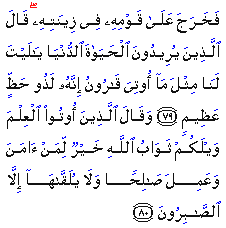Infatuation with Luxuries, Company of the Miskin, Breaking Bread Together
Issue 526 » April 24, 2009 - Rabi Al-Thani 28, 1430
Living The Quran
Al-Qasas (The Story)
Chapter 28: Verse 79-80
 Infatuation with Luxuries
Infatuation with Luxuries
"And so he (Qarun) went before his people in all his pomp. Those who cared only for the life of this world said: 'Oh, would that we had the like of what Qarun has been given! He is certainly a man of great fortune!' But those who had been granted true knowledge said: 'Woe to you! God's reward is by far the best for any who believes and does what is right. Yet none can attain this other than those who are patient in adversity.'"
Here, we see some people infatuated with the luxuries that the present life can offer, ready to do what they can in order to have their share of it. Others feel that faith is a greater blessing, and hope for God's reward. Thus the value of wealth is set side by side with the value of faith.
The luxuries and splendour that life can give have always captivated people so that they neither look beyond these nor seek any higher or nobler value. They do not ask what price the owner has paid for such luxuries, nor by what means he has obtained them. They covet it whether it is wealth, position or honour. They swarm like flies to it. It does not matter to them whether the price is too high, the method too wicked or the means too lowly.
By contrast, those who maintain their bond with God have a different standard of values by which they look at life. Their souls are too noble to let worldly considerations get the better of them. The dignity they feel as a result of their faith prevents them from yielding to the pressures exerted by others. Such people are the ones endowed with real knowledge and the right sense of proportion: God's reward is far better than all this pomp, and what God gives is better by far than all that Qarun has. To have such insight into things puts people into a nobler category: they are the ones who persevere in adversity and resist temptation. They are the ones who remain patient despite being deprived of what they might wish for. When they prove their patience in the face of adversity and their perseverance in following the way God has laid down, He elevates them to a level that enables them to rise above all that life on earth can offer. Thus do they seek only God's reward, and with confidence and reassurance.
Compiled From:
"In The Shade of The Quran" - Sayyid Qutb, Vol. 13, pp. 272-273
Understanding The Prophet's Life
Company of the Miskin
Ibn Majah reported from Abu Said al-Khudri and al-Tabarani from Ubadah ibn Samit, The Prophet (peace be upon him) said: "O God, have me live miskinan and have me die miskinan and gather me [hereafter] in the company of the miskin." Some people read this hadith and understand al-maskanah to mean want of material wealth, with consequent neediness before other human beings. Now, this understanding of the meaning repudiates the supplication of the Prophet against the affliction of poverty [Bukhari, Muslim], and his asking from God, virtue and prosperity [Muslim, Tirmidhi, Ibn Majah], and his saying to Sad: "Indeed, God loves the slave [who is] prosperous, God-fearing and not ostentatious," [Muslim, Musnad Ahmad] and his saying to Amr ibn al-As: "Excellent indeed is the righteous wealth of a righteous man!" [Musnad Ahmad, Al-Hakim]
What is meant by al-maskanah is as Ibn al-Athir said: "He meant by it lowliness and humility before God, and lest one should become one of the oppressors and the arrogant."
That is how the Prophet lived - far from the life of the arrogant ones, whether in look or form: he dressed as the slaves and the poor dressed; and he ate what they ate; and when a stranger came he (the stranger) was unable to distinguish him from his Companions for he was with them as one of them; and at home he mended his show with his own hand; and he patched his cloak; and he milked his sheep; and he turned a millstone to grind grains alongside the woman neighbour and the slave.
When a man entered to him and, being in awe of him, was trembling, he said: "Be at ease, for I am not a king. Rather I am the son of a woman of the Quraysh who used to eat dried meat in Makkah."
Compiled From:
"Approaching the Sunnah" - Yusuf Al-Qaradawi, pp. 32-33
Blindspot!
Breaking Bread Together
In creating the conversation and social space that support community, another dimension of welcome is what has traditionally defined culture: food. It brings the sacred into the room. It is the symbol of hospitality. It is as direct as we can be about a life-giving act. When we take it seriously, we know how to do this right. What is needed is consciousness about having food and what kind of food fits our intention.
One small request: Most food served in meetings is about satiation, not about health. Even in health care settings and meetings about creating healthy communities, we serve pastries, cookies, fast food, chips, pretzels. This is not food; it is fuel and habit that is nutritionally and environmentally unconscious.
Let there be apples, grapes, bread (unleavened if possible). Natural, healthy food, prepared by local merchants. Food that reflects the diversity of the world we are embracing. Grown within 50 miles of our gathering place to reduce the carbon footprint.
Some people will complain. Let them.
Compiled From:
"Community: The Structure of Belonging" - Peter Block, pp. 148-149